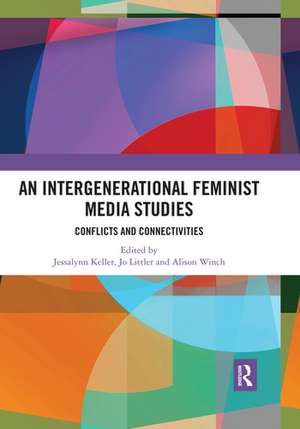An Intergenerational Feminist Media Studies: Conflicts and connectivities
Editat de Jessalynn Keller, Jo Littler, Alison Winchen Limba Engleză Paperback – 30 iun 2020
This book covers a range of media forms: film; games; digital media; television; print media; and practices of media production, intervention, and representation. The contributors explore how figures at particular stages of life—particularly the girl and the aging woman—are constructed relationally and circulate within media, with particular attention to sexuality. The book emphasizes exploring the ways in which the category of generation is mobilized in order to gloss sexism, racism, ageism, class oppression, and the effects of neoliberalism.
The chapters in this book were originally published as a special issue of Feminist Media Studies.
| Toate formatele și edițiile | Preț | Express |
|---|---|---|
| Paperback (1) | 251.78 lei 6-8 săpt. | |
| Taylor & Francis – 30 iun 2020 | 251.78 lei 6-8 săpt. | |
| Hardback (1) | 765.01 lei 6-8 săpt. | |
| Taylor & Francis – 10 apr 2018 | 765.01 lei 6-8 săpt. |
Preț: 251.78 lei
Preț vechi: 302.89 lei
-17% Nou
Puncte Express: 378
Preț estimativ în valută:
48.18€ • 50.47$ • 39.93£
48.18€ • 50.47$ • 39.93£
Carte tipărită la comandă
Livrare economică 09-23 aprilie
Preluare comenzi: 021 569.72.76
Specificații
ISBN-13: 9780367519131
ISBN-10: 0367519135
Pagini: 200
Dimensiuni: 174 x 246 x 18 mm
Greutate: 0.36 kg
Ediția:1
Editura: Taylor & Francis
Colecția Routledge
Locul publicării:Oxford, United Kingdom
ISBN-10: 0367519135
Pagini: 200
Dimensiuni: 174 x 246 x 18 mm
Greutate: 0.36 kg
Ediția:1
Editura: Taylor & Francis
Colecția Routledge
Locul publicării:Oxford, United Kingdom
Public țintă
Postgraduate and UndergraduateCuprins
Introduction: Why "intergenerational feminist media studies"? 1. Pretty past it? Interrogating the post-feminist makeover of ageing, style, and fashion 2. Handover women: Hong Kong women filmmakers and the intergenerational melodrama of infidelity 3. Post-postfeminism?: new feminist visibilities in postfeminist times 4. "Older-wiser-lesbians" and "baby-dykes": mediating age and generation in New Queer Cinema 5. Growing pains: feminisms and intergenerationality in digital games 6. In the silences of a newsroom: age, generation, and sexism in the Indian television newsroom 7. Fifty shades of fandom: the intergenerational permeability of Twilight fan culture 8. Bridges, ladders, sparks, and glue: celebrating and problematizing "girl-driven" intergenerational feminist activism 9. The rhetoric of the mistake in adult narratives of youth sexuality: the case of Amanda Todd 10. Intergenerational feminism and media: a roundtable
Descriere
This book emphasizes exploring the ways in which the category of generation is mobilized to gloss sexism, racism, ageism, class oppression, and the effects of neoliberalism. It examines a range of media forms, and practices of media production, intervention, and representation. It was first published as a special issue of Feminist Media Studies.
